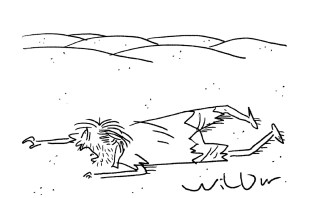The year is 1993 and 16-year-old Tommo has been moved from a day state school of 2,000 pupils in brown blazers that ‘when it rained… smelled of shit’ to Eskmount, an elite Scottish boarding school, where boys wear kilts and put their ‘cocks on your shoulder’ when you’re working in the library (easier in a kilt) and routinely hang ‘smaller kids in duvets… out the window’. The horseshoe effect in schooling terms: the more expensive, the more savage.
Hugo Rifkind’s Rabbits opens with a bang: ‘When the shotgun went off under Johnnie Burchill’s brother’s chin, word had it, the top of his head came off like the top of a turnip lantern.’ It is reminiscent of Donna Tartt’s The Secret History. We do eventually learn what really happened to Douglas Burchill, dead at 19, but at the heart of the novel is a lonely adolescent trying to find his footing. Tommo is parentless: ‘My mum was in hospital… my dad was in Hollywood, and I lived with a cat.’ Rifkind captures a boy’s inability to process his mother’s mortality: ‘I hugged her now like she was a bunch of delicate lightbulbs in a bag.’
‘Souping’ involves chucking a jug of milk mixed with haggis and ketchup over another boy’s head
Tommo desperately wants to belong, and does manage to join the inner circle, who take him to house parties in crumbling castles with chain-smoking teens getting drunk on wine. He has the wry humour of a Holden Caulfield – ‘Windy, grey, Edinburgh, March. One of those days when you can really see why the Romans left’ – and his character portraits are vivid and funny. A girl, Zara, is described as having ‘hair she kept throwing about, like she was a horse’s bottom’.
The novel captures the awkwardness of boyhood, of fierce friendship, the danger of neglect and navigating girls who treat Tommo like ‘mould’. Beneath the ‘blazing hedonistic delight’ lies the metallic aftertaste of vomit and fear. Despite Tommo’s older sister Annie saying, with ‘tipsy venom’, ‘You’re one of them now’, Tommo feels he is in ‘butler class’, not quite upstairs or downstairs, somehow lingering on the stairwell.
There are many terrors when trying to fit into the upper echelon: ostracisation, hidden grammatical tests (the plural of pheasant is not ‘pheasants’) and the sartorial agony of trying to dress for a shoot. Rifkind nails the blood-chilling brutality of the upper classes. The men are brutish, but the women are the crueller, as the lady of the house says: ‘You’re the boy… who tries to stay. In other people’s houses. For as long as they’ll let him.’ There’s a vignette when Tommo goes round to a warm middle-class household where mums are nice and there is neither snow nor the crimson gore of gralloching (gutting a deer), but you miss the dark glamour of the aristos.

Eskmount is a school where boys ‘fashion their Remembrance poppies into ninja darts’ and who regularly pass out at the army camp. Then there’s the lexicon of hazing. ‘Souping’ involves chucking a jug of milk mixed with haggis and ketchup over another boy’s head. There are echoes of Tom Brown’s School Days throughout and one can’t help but recall Charles Spencer’s recent memoir A Very Private School. Rifkind’s message reads afresh in today’s political climate: ‘posh’ adolescents are vulnerable, have feelings and deserve to be protected as much as any other young person.
Nevertheless, Tommo breezes into Cambridge and the trials of university, in comparison, are ‘nothing: mayflies after you’ve fought off bats’. Yet still he is haunted by the fear of expectation: ‘The greater the scented potential, the bleaker I felt.’ Shotguns, drugs, kilts, testosterone and a lonely-boy hero caught up in a murder mystery is a dangerous combination. It is not obvious what is autobiography and what is fiction here, but Rifkind has clearly drawn a world he knows extremely well.






Comments